#france riots today
Text
I’m okay with most of these combinations for the World Cup finals, but I don’t think I can sit through Croatia v France again.
#World Cup#world cup 2022#god tier is obviously Croatia v Morocco#I’m fine with Argentina playing and winning too#but if France wins again I will riot#if Argentina wins today I will only be rooting harder against France tomorrow
13 notes
·
View notes
Text
THE FINAL OF EUROVISION IS TODAY ???
#i'm so busy with this thesis#i'm going to discover the songs today#I really hope france is not giving us another metro 6 song#or i will riot#eurovison
2 notes
·
View notes
Video
youtube
TIME TO STAND FOR YESHUA CHRIST!
1 note
·
View note
Text
On the eve of planned nationwide demonstrations, I want to offer an overview of the ways the protests in France are being handled by the government so far (and if what you’ve heard is that this is over a 2 year increase in retirement age, please do take a minute to read this post to get a better idea of the context)
1. In Paris on March 21, a CRS (cop) threw a tear gas grenade in the air towards protesters (they’re supposed to throw them near the ground); the grenade landed and exploded on a protester’s head. (x)
2. Massive use of tear gas at every protest, on this vid from March 17 you can see the Place de la Concorde (largest public square in Paris) drowned in tear gas. (x)
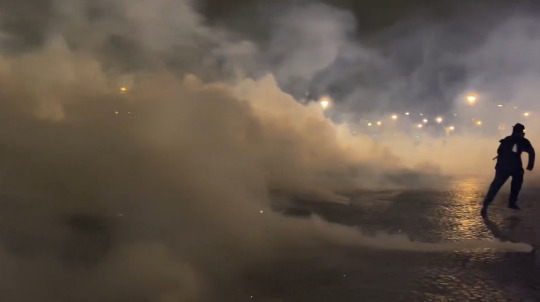
3. In Paris on March 20, video of a CRS with a baton hitting protesters who are cowering against a wall (x)
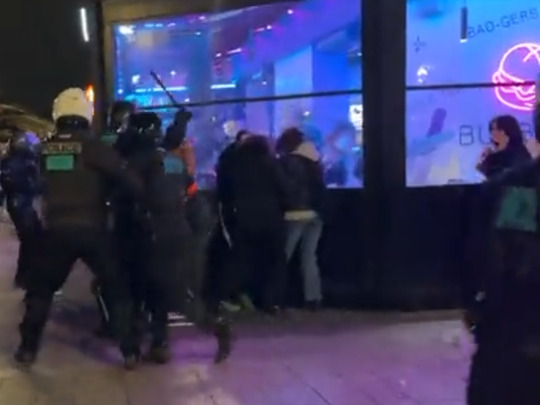
4. CRS grabbing demonstrators in (illegal) chokeholds and dragging them by the neck (x)
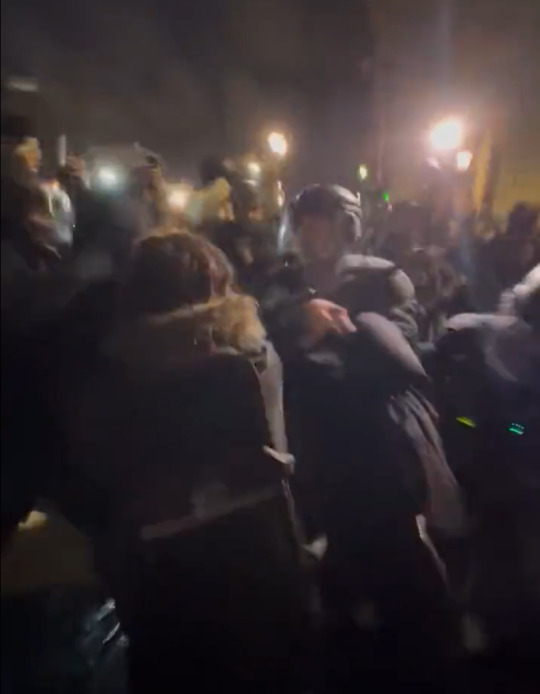
5. In Strasbourg on March 21, police trapped about a hundred protesters in a narrow alleyway and tear gassed them from both ends of the alley so they couldn’t escape; an asthmatic person lost consciousness; people who lived there opened their doors and let the protesters enter their houses to get to safety. (x)
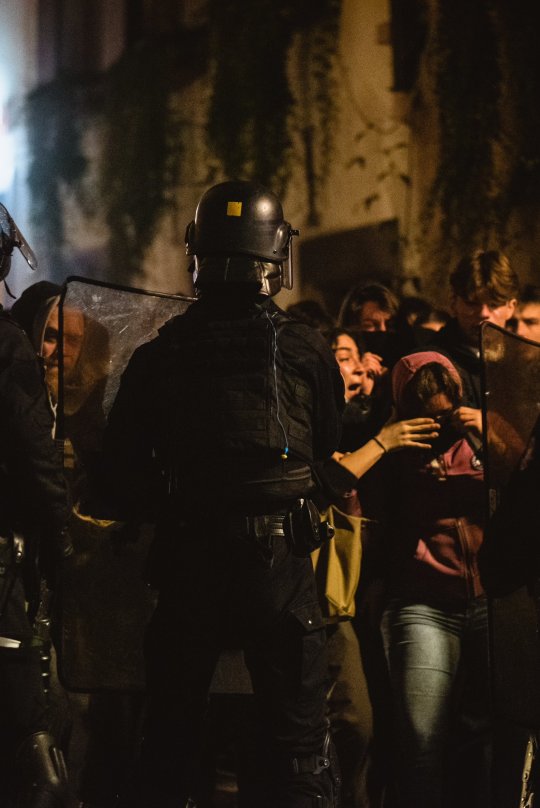
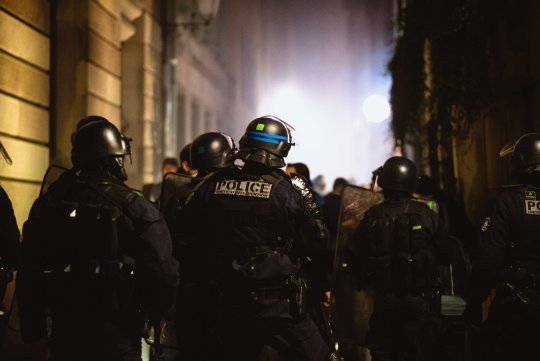
6. In Paris on March 20, a CRS shot a protester with an LBD riot gun (rubber bullets) and shouted at him “Pick up your balls now, fucker” (x) (an allusion to the several instances in recent years of protesters having testicle injuries from LBD guns - and non-protesters too, in 2015 a Muslim teenage boy lost a testicle after being shot by a cop with rubber bullets when he was shooting firecrackers in a park on July 14th / Bastille day). A few seconds later in the video another CRS tells the one who said that “careful there’s a camera”
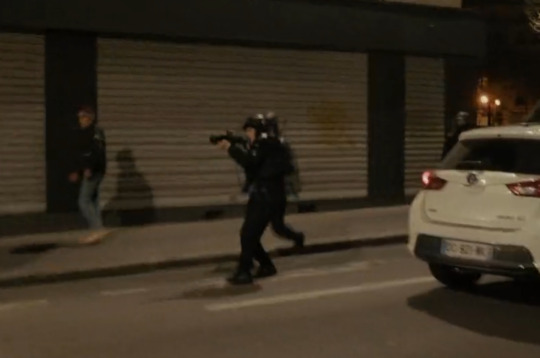
7. In Paris on March 21, a group of 4 or 5 CRS who were dispersing demonstrators, threw a homeless man to the ground who had been shouting at them (hard to hear what he said, the first sentence is “How can you do this job?”), kicking him in the head while he was down and mocking him when he couldn’t get up, calling him a ‘fatso’ and ‘sack of shit’ (the woman you can hear at the end of the video is yelling at the CRS to help the guy get up and telling them “do you lack humanity to this point?”) (x)
8. That same day Macron gave a speech on TV in which he said “the crowd [= the protesters] has no legitimacy against the people, who express themselves through their elected representatives” even though he passed his reform without a vote from the elected representatives—and considering polls show the vast majority (>70%) of the country is against the reform, the “people” and the “crowd” are one and the same. Today (March 22) he gave another TV speech in which he compared what’s happening in France right now to the January 6 US capitol attack.
9. During today’s speech Macron also said “minimum-wage workers have never seen such an increase in purchasing power” which is a mad thing to say in the middle of a cost of living crisis, and he used the term ‘smicard’ in this sentence— the minimum wage in France is called the SMIC and smicard is a derogatory word for minimum-wage workers. He decried the “extreme, unregulated violence” of protesters but had nothing to say about the unregulated violence of his police forces, and instead stoked the fire with contemptuous language that angers people the day before a planned mass protest.
10. Hundreds of protesters (and even people who weren’t protesting but just nearby) have been arrested and taken into custody in “preventative arrests”; the vast majority were then released due to “absence of an offence.” Here’s a thread by a woman who was arrested in Paris along with 11 other women (one was a 17 year-old girl) for taking part in a peaceful protest. They spent 20 hours all in one cell, were only allowed to go to the toilet if they left the door open, were frisked and had their fingerprints and DNA samples taken. Also, in Nantes on March 14, four young women age 18-20 reported having been sexually assaulted by police during body searches while participating in a student protest.
And a thread by a 19-year-old Black student who spent 48 hours in custody last week along with 4 other people who were arrested in Paris as they were walking down the street. Lots of racist shit in this thread. He had already spent 14 hours in custody after a protest a couple of days before, and ended up being charged for refusing to have his DNA samples taken.
This article in Le Monde from yesterday (it’s in French and unfortunately paywalled) talks about people who took part in last week’s protests having been handcuffed and searched in their underwear then released free of charges the next day; a lawyer comments how this is clearly meant to discourage people from demonstrating. The article also mentions two 15 year old Austrian boys who were on a class trip to Paris and were rounded up with a group of demonstrators, so the Austrian embassy had to intervene. (Journalist mentions sarcastically “We don’t know if these high schoolers’ DNA samples were taken.”)
11. There are videos from various protests of journalists wearing the press armband being threatened, hit, or shoved to the ground by police. In Montpellier yesterday, a journalist took this photo as a CRS was pointing his rubber bullet gun at his head and another was running at him with his baton telling him “I don’t give a fuck about your press card” —the photographer managed to run away. (x)
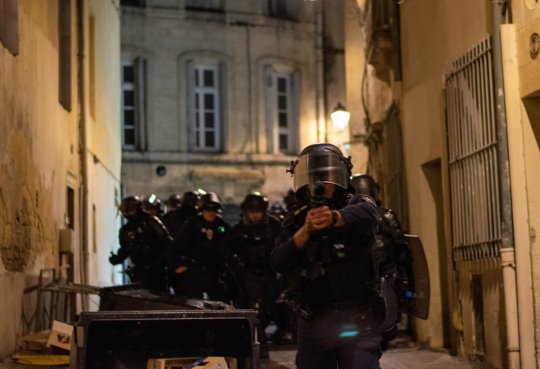
This is all from the past ten days (and mostly from the past two days) and far from an exhaustive list, there's so much outrageous stuff happening (like the Minister of the Interior lying and saying participating in an undeclared demonstration is illegal, when it’s not) but it gives a good idea of what French democracy looks like under Macron. The above photo says it all really. And thank you to all the people who continue taking part in the protests and strikes.
#frpol#police violence#not sure what to tag this as#i know it's very far from the usual theme of this blog but people should know what a shitshow this country is rn#all the photos are from the tweets that i've linked
4K notes
·
View notes
Text
Some times ago, I posted about the vandalizing of the Wall of the Justs at the Parisian Shoah memorial. The post is here if you are interested, and it got many, many notes, so I thank you very much!
But I hope this post will also get as many notes - because we found the guilty party. We know who did it and... gosh, it sounds like a fucking joke but it is not, and it just proves how complex the situation is, and how dangerous the times we are living are.
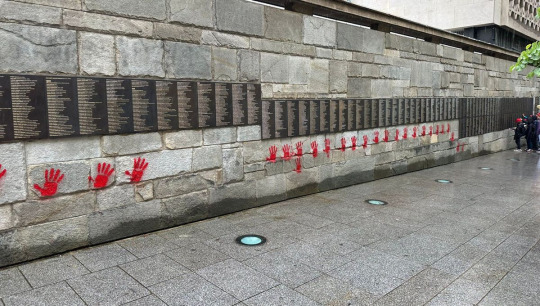
If you recalled the obvious guilty party, the first suspects, the ones that seemed to have done that were the so-called "pro-Palestinian" activists that in fact are just antisemitic people disguising their hatred under the pretense of "fighting for Palestine". It is well-known that the pro-Palestinan manifestations, events and representatives in France have all versed at one point or another into very antisemitic comments or actions, and the movement is currently being parasited by antisemitism - ranging from actual antisemites who use "Zionist" as a way to designate all Jews, including French-Jews who never saw Israel in their life ; to people who are taking back antisemitic slogans without knowing they are antisemitic in the first place.
The reason the investigation directly was aimed at them was very simple: the red hands, or red handprints, is a symbol that many pro-Palestine manifestants have been using recently. Which, in itself, sparked a whole new debate - about whether it is an antisemitic symbol or not. Because while for some it is the universal "You have blood on your hands" symbol, for others it refers to the blood of a soldier of Israel on the hands of his murderer, during the second Infifada... And while attacking the Wall of the Justs would have been a new low and a new step for these left-leaning antisemites (because so far they only attacked Jews, now they would attack those that saved Jews and assorted Nazi victims during World War II), it was in line with a new form of radicalization of the movement - see the "Block Out" phenomenon on Internet, a cancel culture aimed at those that did not support enough Palestine... As a personal note I will say: where was all this energy and effort when the it was time to defend the Uyghurs against their wiping out by the Chinese regime? It is still time today, their suffering is still going on... But as a prominent Uyghur activist said (I think it was Rebiya Kadeer, but I do not have my notes with me so I might be mistaken) - people care less about the Uyghurs than Palestinians for one simple reason "Because it isn't Israel that is killing us..." It is China, and as a result nobody really cares...
Anyway, I digress... So while it is known, confirmed and recorded that the so-called "pro-Palestine" activists in France are slowly oscillating and sinking into antisemitism, it isn't actually them who did these red handprints. No, they're not guilty this time.

In fact it is something I talked about when I made my original post: there was another very likely suspect which would have surprised nobody. Neo-Nazis. Because while the pro-Palestinian movement is currently crystallizing in France the entire antisemitism wave that has been on the rise for a decade now among the extreme-left, the extreme-right political groups have also been gaining terran and strength for quite a long time, and now, we have actual neo-Nazi parties very vocal and active today... Due to the ungodly amount of terrorist attacks France had to face, due to the frightening strenghtening of radical and extreme Islam in France, due to the whole endless debates about immigration in France, and due to the hyper-violent civil unrests that are clearly just to cause chaos and nothing else (like the riots following the death of Nahel Merzouk, which clearly were not about the Nahel case and just to cause as much destruction and steal as much things as possible)... Well of course, when these types of problem arise, who gains the upper-hand? The extreme-right.
And so now we have far-right candidates so popular they have a good chance of being elected as the representatives of France, and we have many groups of antisemitic Christian fanatics popping up everywhere, and we have neo-Nazi movements literaly returning like some perverted phoenix from their ashes... As such, it was thought that maybe these red handprints could have been the work of a neo-Nazi movement, who would use the current situation to perform their antisemitic deeds while blaming the extreme-left for it... After all, the two movements have been currently doing the exact same thing. Before the Hamas attack, far-right groups were defacing Jewish cemeteries and soiling Simone Veil's grave with Nazi swastika ; and today far-left activists are "denouncing" Israel by... tagging on Jewish temples drawings mixing the six-point stars with a swastika...
So, you know, the typical horseshoe effect. The two extremes are literaly doing the same things, and as such we have a hard time differentiatng one from another.
But no... Turns out it isn't them either! Turns out... it isn't even French people who did this.
And here's where the dark joke comes... You know who did it? FUCKING RUSSIA OF COURSE!
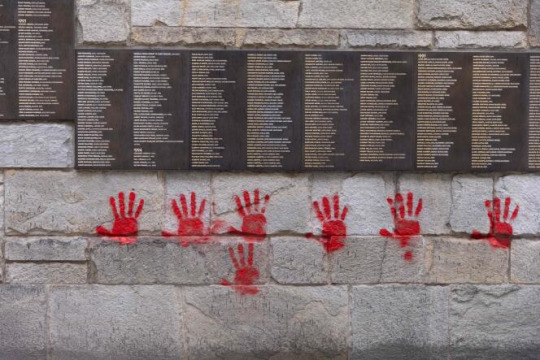
We forget to so easily that Putin is literaly sending his agents in every friggin' political or social event that goes on in the world right now... And in fact that's the whole point: Putin wants us to be so obsessed with the Israel-Hamas conflict and how Gaza is trapped in it all, so that we forget about how Russia is currently destroying Ukraine.
The investigation found out that the people who painted these red hands were three men that had recently arrived in Paris from Bulgaria... They were staying at an hotel and the very day following their crime, they left France for Belgium (Bruxelles to be precise). Now... You're going to say "So they're just Bulgarians? They're not Russians, nothing proves its Russia". Except for one thing... While yes the involvment of Russia has not been "confirmed", Putin's Russia is not known for its vivid imagination... And they have literaly done the same thing some times ago.
If you recall, I posted about it before... It happened last october. Right after the Hamas attacked the music festival, causing the whole madness we are into today, blue David stars were painted on buildings where Jewish people lived, echoing the dark times of the Nazi Occupation in France... Here is the post I made back in February, and I couldn't guess how far things would go back then... While everybody was getting scared about the return of French antisemitism turned out... It was a group of people from Moldavia that was paid to paint those stars everywhere. Paid by... a pro-Russian, pro-Putin Moldavian businessman, Anatoli Prizenko.
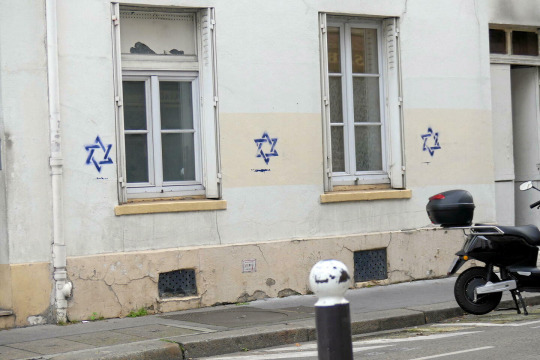
You can read more about this on my old post, but investigation concluded it was indeed an operation where Russian forces used the Moldavians as puppets. All to cause fright and chaos in France. When you consider that Bulgaria, like Moldavia, is unfortunately today one of the "screen-countries" Russia likes to use to shield themselves when doing their dirty chores... Blue stars, red handprints... This is clearly the same thing, done all over again.
And where the "joke" part comes out even more - in the sense of a perverse, venomous, fetid joke part of some putrid dark comedy... Russia has currently been truly harassing France through all sorts of operations, each more outlandish than the next, and yet all working in their own way to cause fear and chaos... More specifically two cases are regularly being brought up.
Case 1: The Doppelgänger operation
In June of 2023, the French authorities warned about what was called the "Doppelgänger operation". A massive campaign of Internet misinformation created by Russia. The purpose was simple: create mirror-websites to the official websites of French information networks, newspapers and TV channels. They were almost identical to the official news outlet of France, to the point many mistook them for the real thing - sometimes the only difference you could spot was in the URL. ".fr" became ".ltd", and ".com" became ".cam".
And all those fake websites shared articles about the Ukrainian-Russian war, articles written purposefully to spread misinformation about Russia. Some claimed that the Ukrainian population were in full distrust of their government and wanted to see it brought down... Others wrote that all the Ukrainian operations were disasters and failures. Some invented fake tragedies and disasters in Russia to try to paint Ukrainians as the villains. And others yet wrote about how the donations of Europe to Ukraine were either wasted by the Ukrainians, or would cause economic crisis in European countries...
Case 2: The bed bugs hysteria
In september of 2023, the discovery of bed bugs on several public places in Paris was shared on social media. Some were discovered in a movie theater, the presence of others was attested in some subway lines... The social media being what they are, it became a hot topic talked about by everybody, shared by everyone - and the facts were exaggerated, and rumors started spreading, and soon an entire mass hysteria started overtaking France. It wasn't just Paris anymore, but all the big cities that were supposedly infested by "bed bugs". People claimed to find them in every public places - every theater, every subway line, every hotel, even in hospitals...
Turns out, there wasn't as much bed bugs as the social media wanted us to believe. It was mostly a sanitary mass panic, echoing the fear caused by the Covid epidemic and fed by the worries about the upcoming Olympic games. And... and also fed by Russia. Investigations revealed that there was a lot of fake accounts, troll accounts and bots created by Russian servers and Russian URLs, and who spent their entire time spreading and sharing bed-bugs articles, writing fake articles twisting the facts, and spamming everybody with news of this mass hysteria..
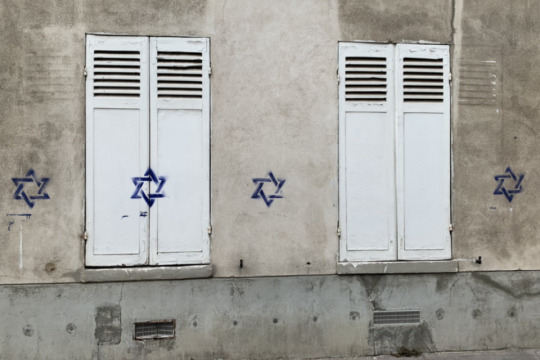
This is the sore and infuriating conclusion. Remember, everyone, that this isn't just about Israel and Palestine... It isn't just about the Hamas or Netanyahu... And we already knew that, because already in Europe it was clear this wasn't truly about what happened in the Middle-East - it was also about the shadows of antisemitism and the wraith of the Nazi presence, it was about the extreme-left movement spreading from the USA university down to European ones, it became a fight about the Jewish and Muslim populations in Europe rather than in Palestine and Israel - and even more, a political fight between the far-right and the far-left across the continent... But it isn't just about that anymore, because now Putin is in the dance and Russia is gleefully putting oil on the fire in hope it will burn everything... This is a fucked-up chess game with many, many players... That all look the same in the end, somehow, so it becomes hard to identify which one does which move.
But at least we know who painted the blue stars, and who painted the red hands, and who pits the extreme-left against the extreme-right, and is trying to make sure the Jewish people of France are feeling scared in their own country. Putin and what he turned Russia into.
#france#putin#russia#antisemitism#shoah memorial#wall of the justs#putin's russia#russian propaganda#far right#far left#extreme right#extreme left#misinformation#mass hysteria#antisemitic#ukraine
70 notes
·
View notes
Note
Matthew gives off very much husband vibes.
Could you maybe do a fluffy one where it’s the reader first night with him in there new home as a married couple
-🦵🏻
My first fluff ☺️ I look forward to this as he's usually written in a smut setting. And you know I'm delusional so this is gonna be as sweet as I can make it.
Hope you like it 🩵
This day is the day some describe as the best day of your life. And it was. Family and friends gathering for the union of two people who swear to love each other forever. Today was your day. The weather suited well today on a lovely morning in France.
From the moment you saw yourself in your dress to the moment Matthew saw you and burst into tears as you walked down the isle with your father.
Your vows were sweet yet impactful. Neither one of you could keep it together. You tried so hard not to ruin your makeup but by then, you didn't care. This was the day you were marrying the love of your life and you didn't regret a single thing.
The reception was a party. Absolute riot. Of course Brady and Matt were the life of the party, other teammates cheering us on as we entered the venue. Safe to say everything went off with a hitch. The first dance, to the food, the cake, endless drinks (of course upon Brady's request), all the way to the honeymoon.
"It feels good to have some piece and quiet for the first time today." you tell Matty after bidding the goodbyes and finally getting into the limo.
We leave for our official honeymoon tomorrow. Tonight we wanted to enjoy each others company before the trip to Fiji.
"Your telling me. I'm glad we stopped Brady from requesting Gangnum Style for the fourth time in a row."
We pulled up to the hotel, all giddy and giggling with each other. Happy to be alone. With your husband. You, his wife. You let out a yelp as Matt picks you up bridal style after unlocking the door. He kisses your cheek softly before placing you gently on the bed. The yawn you let out afterwards displays the events of today finally hitting you hard with exhaustion.
"Ready for bed? Mrs. Tkachuk?" he asks undoing his tie. "Most definetly. You'll get my dress for me?"
You move your hair out of the way for him to unzip your dress and remove your necklace. Not before placing a gentle chaste kiss at the base of your neck. Nothing sexual, just tender affection.
He wraps his arms wrap around your waist as you look out along the France skyline, admiring the city and the sound of bustling people below.
"I love you Matthew Tkachuk," you say turning around in his arms, wrapping yours around his neck.
"And I you, Mrs. Y/N Tkachuck. Now and always."
134 notes
·
View notes
Text
French TV is just amazing. I don't own a TV so I only watch it when I'm at other people's place and the news channels are simply phenomenal. We're told a 16 years old guy was killed by the police again (and the police didn't call for an ambulance it's a neighbour who did -10 minutes later- because some kids came to tell him what had happened) so the journalist asks a police union representative to give us his opinion which is of course that if you try to run from the police you should expect to be killed. In other news today Marion Marechal Le Pen is campaigning to revive her nazi party because she wants to "protect her daughters from the anti-police riots and the illegal immigrants who rape french women". Think the journalists are going to address this quote? Nope. Then the journalists discuss the inflation in France and how the prices are so high that french people are struggling to feed themselves (in one of the richest country on earth). A journalist gives us a simple solution: we need to be more responsible and stop buying expensive food. Merde alors! Hadn't thought of that. This way the brands that increase their prices will lose money and stop doing so. Duh! Anyway back to the most pressing matter nationwide right now and for the last decades: should muslim teenage girls be allowed an education if they wear a veil? Survey says... non, apparently. A girl was expelled for wearing what she claims to be an opened black kimono but really is an outrageous religious symbol that threatens our great nation's secularism.

Wow. Not only did she deserve to be expelled but it's definitely worth talking about all day on the news. I'm traumatised just looking at this picture. Of course the great debate is back: how can we stop those provocative muslim girls who are obviously on their way towards islamic radicalisation and terrorism from trying to bypass secularist laws by claiming to be wearing some sort of kimono when really we all know it's just a facade and what they really mean to do is scream allah akbar with a machine gun in their hands? The journalists quickly ask a law professor who explains unironically that this outfit is illegal in much the same way that muslim girls who wear long skirts because they can't wear a hijab are illegal. Almost as if it's not about displaying your religion but belonging to a religion instead. Almost as if girls are forced to show their bodies to men. If I ever doubted selling my TV years ago here is the reminder as to why I did.
103 notes
·
View notes
Text
In May, pro-independence demonstrations spread across New Caledonia, a small Pacific island territory that has been ruled by France since 1853. Waving the flags of the Indigenous Kanak people as well as the flag of the pro-independence Socialist National Liberation Front, demonstrators took to the streets to protest voting reform measures that would give greater political power to recently arrived Europeans.
Curiously, however, they also waved another flag—that of Azerbaijan. Although the similar colors of the New Caledonian and Azerbaijani flags led some to speculate whether the demonstrators had inadvertently acquired the wrong flag, other observers viewed the presence of the Azerbaijani flag as an indication of ideological support from Baku.
It turns out, the Azerbaijani flags were not mistaken. Since March 2023, Baku has strategically cultivated support for the New Caledonian independence movement under the guise of anti-colonial solidarity. As payback for French diplomatic backing of Armenia after Azerbaijan’s 2020 invasion of Nagorno-Karabakh, Baku has disseminated anti-French disinformation related to New Caledonia. Following the outbreak of protests this May, France publicly accused Azerbaijan of doing so.
Baku’s influence campaign successfully inflamed long-simmering hostilities toward French descendants in New Caledonia, culminating in violent demonstrations and riots, which triggered a visit by French President Emmanuel Macron—as well as French police forces—even though Macron ultimately issued a de facto suspension of the reforms.
The incident in New Caledonia is hardly an isolated one. Anti-colonialism, which rose as a powerful ideological force during the 1960s and 1970s, is having a resurgence, and its philosophical underpinnings continue to shape some of the biggest geopolitical crises of the day, from Gaza to Ukraine. But unlike the decolonization movements of the Cold War era, this wave is being driven by opportunistic illiberal regimes that exploit anti-colonial rhetoric to advance their own geopolitical agendas—and, paradoxically, their own colonial-style land grabs.
The basic aims of the decolonization movement during the Cold War were twofold: securing national independence for countries colonized by the West and preserving sovereignty for postcolonial countries in Africa, Asia, and Latin America, whether through armed struggle or ideological diplomacy. Focused on ending the Vietnam War and fighting white minority rule in southern Africa, the movement quickly became the cause célèbre of the international left.
Despite divergent views on economic and social issues, the movement’s proponents coalesced around a central belief that Western imperialism, particularly the U.S. variant, singlehandedly held back the advancement and development of what was then known as the third world—ignoring the fact that many anti-colonial movements often had their own internal issues of graft and corruption. Disheartened by the West’s history of imperialism, many on the left even embraced authoritarian leaders, such as Zimbabwe’s anti-colonial freedom fighter-turned-despot Robert Mugabe and even former North Korean dictator Kim Il Sung.
Today, the anti-colonial movement is less about securing independence for the few remaining colonial outposts or debating the proper developmental pathway for countries in the global south. Bolstered by powerful state-backed media corporations in the capitals of authoritarian states, the current movement is largely a Trojan horse for the advancement of global illiberalism and a revision of the international rules-based order.
Authoritarian governments in Eurasia have taken their influence operations to social media, where they hope to inflame grievances—possibly into actual conflicts—to divert the attention of Washington and its allies from areas of strategic importance. This is the case for not only Azerbaijan, but also for China in sub-Saharan Africa, as well as Iran, which provides financial support to anti-Israel protest groups in the United States.
But more than any other country, it is Russia that is attempting to ride the resurgent anti-colonial wave and position itself as a leading voice of the global south. Russian leadership describes itself as the vanguard of the “global majority” and claims to be leading “the objective process of building a more just multipolar world.”
After his visit to Pyongyang in June, Putin wrote in North Korea’s main newspaper that the United States seeks to impose a “global neo-colonial dictatorship” on the world. In the United States, several Russians alleged by prosecutors to be intelligence agents have been accused of funneling financial support to an anti-colonial Black socialist group to promote pro-Russian narratives and justify Russia’s illegal military actions in Ukraine. And in regard to New Caledonia, Russian Foreign Ministry spokeswoman Maria Zakharova fanned the flames when she said in May that the tensions there stemmed “from the lack of finality in the process of its decolonization.”
Moscow’s primary stage to project itself as the spearhead of a new global anti-colonial movement is Africa. During the Cold War, the Soviet Union provided ideological and military support to numerous national liberation movements and anti-colonial struggles in sub-Saharan Africa on the grounds of proletarian internationalism and socialist solidarity. According to a declassified 1981 CIA report, Namibia’s SWAPO guerilla group received nearly all of its arms from the Soviet Union, and Soviet military personnel trained South African anti-apartheid guerrillas in Angola-based training camps. Moscow also trained and educated a large number of African independence fighters and anti-colonial rebels at Communist Party schools and military institutes back in the Soviet Union.
This legacy of Soviet internationalism and socialist goodwill generated lingering sympathy for the Kremlin, and Russia continues to be widely perceived as a torchbearer of anti-colonial justice and national independence on the continent, particularly in the Francophone Sahel region. Before his death in August 2023, former Wagner Group leader Yevgeny Prigozhin blamed instability in the Sahel on Western interventionism, saying, “The former colonizers are trying to keep the people of African countries in check. In order to keep them in check, the former colonizers are filling these countries with terrorists and various bandit formations. Thus creating a colossal security crisis.”
Despite Moscow’s own imperialist legacy and its current war of recolonization in Ukraine, Russia is increasingly seen as an anti-Western stalwart in the Sahel and a key supporter of anti-French political movements. Kremlin-backed mercenaries from the Wagner Group’s successor, Africa Corps, have supplanted French security services as the primary counterinsurgency force for fragile West African governments. And in addition to the counter-insurgency operations, Russian mercenaries have provided personal protection for key African military and government leaders.
But the shift from French to Russian interventionism in the Sahel raises the question of just how much national sovereignty the governments in the affected countries have.
Military juntas in West Africa exploit anti-French sentiments among the general public in order to obscure the fact that they are merely relying on a different foreign state for regime security, effectively trading one colonialist power for another. Most importantly for the juntas, unlike the French, the Russian security forces have no qualms about violently cracking down on political dissent and committing war crimes. For example, in late March 2022, Russian mercenaries assisted the Malian military in summarily executing around 300 civilians in the Malian town of Moura, according to Human Rights Watch.
With its colonial baggage, France has struggled to penetrate pro-Russian propaganda in its former African colonies. For instance, Afrique Média, an increasingly popular Cameroon-based television network, often echoes the Kremlin’s positions on international events. In April 2022, Afrique Média promoted a Russia-produced propaganda video that depicted a Russian mercenary escaping his African jihadi captors and then revealing U.S, and French flags behind an Islamic State flag, suggesting that these Western countries are supporting religious extremists.
Russia’s anti-colonial crusade belies its efforts to advance its own political and economic interests. Moscow’s efforts in Africa are borne from a desire to undercut Western influence in the region; shore up diplomatic support for itself in multilateral forums, such as the United Nations; and reinstate Russia’s reputation as a global superpower. Moscow may also seek to secure access to Africa’s vast natural resources, including criterial minerals, and take advantage of illicit networks, such as illegal gold mining, to circumvent international sanctions and fund its war in Ukraine.
Authoritarian regimes, including those in Russia, China, and Azerbaijan, would not exploit anti-colonial rhetoric if it did not continue to resonate in the global south. Long-standing economic disparities with the global north and painful histories of Western interventionism, especially the post-9/11 U.S. wars in the Middle East, have fostered sympathy for revisionist authoritarian regimes. The current humanitarian crisis in Gaza has heightened feelings of Western hypocrisy among some commentators and public figures in the global south.
As Kenyan journalist Rasna Warah explains, “There is deep sympathy and support [in the West] for Ukrainians who are being bombed and made homeless by Russia but Palestinians being killed and being denied food and water are seen as deserving of their fate.”
Therefore, it is crucial for Western governments to acknowledge the shortcomings of the current international liberal order to governments in the global south, rather than attempting to gaslight them into believing that it is equitable and just. The Western-led international order has a long history of violence and instability in the developing world. The trauma of Western imperialism and colonialism should not be forgotten but rather reworked into developmental programs that help to build robust institutions and infrastructure in the global south.
For example, Germany’s joint declaration with Namibia in 2021, which acknowledged the genocide of the Herero and Nama peoples between 1904 and 1908, committed $1.2 billion over the next 30 years to funding aid projects in Namibia, which are more likely to have a long-lasting positive effect on the development of Namibian institutions than individual financial handouts to descendants of colonial-era violence.
In the near term, the United States and its Western allies should actively counter propaganda from Baku, Tehran, Moscow, and Beijing that seeks to portray these nations as free from interventionist pasts. Exposing their disinformation campaigns in the global south—starting with labeling social media accounts linked to state-run media—could help to alert the public to the presence of bad-faith actors, who exploit genuine anti-colonial grievances for their own political and economic goals.
While the Soviets were certainly no saints, there was a genuine internationalist and collectivist spirit in their interactions with the Cold War anti-colonial movement. The same cannot be said for Russia today.
16 notes
·
View notes
Text
Today's the 250th anniversary of the Boston Tea Party so here's some information on the Sons of Liberty, the lead up to the Boston Tea Party and what happened after!
apologies for any inaccuracies, I wrote this pretty late
The conflict between the American colonies and New England started after the French and Indian war ended with the Treaty of Paris on the 10th of February, 1763. The French and Indian war started because of conflicting territory claims in North America between the British and the French. Originally it was fought between only the British Americans and the French colonists with Native Americans helping on either side (especially with the French because they were severely outnumbered). However two years into the war the United Kingdom - except for ireland - decided enough was enough and officially declared a war with France which started a large world-wide conflict over many territories. In the end, the war was won by the Colonial Americans and British, the French lost all of their North American territory and what used to be their territory was split somewhat evenly between the Spanish and the British but that was only sorted out after the British fought in a war against the Spanish called the Anglo-Spanish war (the first one). So a victory, that sounds good for America right? Wrong. Wars are expensive, maintaining an army is expensive and the British were dealing with many other wars in all different territories at around the same time so England had a national debt of nearly 177.645 MILLION modern day USD.
England had a HUGE poverty crisis. They had to come up with a way to get money and quickly so on April the 5th 1764 the British parliament amended their pre-existing Sugar and Molasses Act. A tax on the importation of wine, molasses, indigo and sugar from places that weren't part of Britain, mainly the non-British Caribbean. This act also banned all foreign rum. Then on March the 22nd, 1765 the British parliament passed the stamp act. A tax on playing cards, newspapers, legal documents. The main problem with this tax was that it couldn't be paid in the paper money used in the 13 colonies, it had to be paid off using the British Sterling which wasn't easy to obtain in America. That and paper was possibly the most important resource in the 18th century. Later in October 1765, a Stamp Act Congress was held in Philadelphia to discuss all of the problems with this act. Then on March the 24th the British passed the Quartering Act which stated that if British troops want to stay at your house you have to provide them with food and let them inside of your house. This was a clear invasion of two very basic rights of Englishmen, private property and personal security.
The Americans fought back against these acts like with Boston's non-importation agreement where merchants from Boston agreed not to buy or sell anything from/to Britain and the Golden Hill riot in New York and the Gaspée Affair which was when a group burned a British ship while the soldiers were off looking for smugglers in Rhode Island, the group was then accused of treason. The most notable of all of these protests though was the later Boston Tea Party.
The Boston Tea Party happened because of a group called the Sons of Liberty which was created in 1765 out of a strong hatred of the Stamp Act. They believed that it was ridiculous that the British could tax the Americans when the Americans didn't even have a representative in parliament, their phrase was 'no taxation without representation'. There's a lot of dispute over what kind of organisation the Sons of Liberty actually was. I might go into all of the theories in another post but for the moment if you want to come up with your own idea on it I suggest looking into them yourself, for this post I'm just going to call them a group or organisation because it's pretty ambiguous. Anyway, the Sons of Liberty usually met at liberty poles/liberty trees which are believed to have been marked as meeting places using the Sons of Liberty's flag. The group was founded in Boston in the Massachusetts Bay colony and it's leader was Samuel 'Sam' Adams.
The Sons of Liberty's first big really move was to burn an effigy of the local Stamp Act enforcer, Andrew Oliver and then burn his office and destroyed the house of his associate. The group's protests were more often then not violent but they got their points across. It didn't help when the Boston Massacre happened in 1770, which only further outraged the colonists, expect the Boston Massacre to get it's own in depth post one day because the court trial was super interesting. Then on the 10th of May, 1773 the British made another act called the Tea Act which made it so that the colonists had to pay more for tea that wasn't legally imported. The Tea Act was meant to help the British East India Tea Company because they were making most of Britains money and they'd gone into a huge debt which caused 20-30 English banks to collapse and started the British Credit Crisis of 1772-1773. The problem was that because the imported tea from Britain was really cheap people didn't buy from local businesses which caused farmers to go completely bankrupt. The Tea Act was the final straw for the Sons of Liberty and many Americans.
Britain sent a shipment of East India Company Tea to America and all of the American colonies that the tea was going to be sent to convinced the people on the ship to resign except for Massachusetts. So the Dartmouth, a ship full of tea arrived in Boston Harbour, Samuel Adams called for a meeting at Fanueuil Hall and thousands of people turned up so they had to move meeting places. During the meeting the Colonists discussed possible resolutions, they decided to have a medium group of men watching the tea to make sure it wouldn't be unloaded and pleaded for the ship to leave. The governor of Massachusetts refused to let the ship leave and two more ships arrived. On December the 16th, 1773, Samuel Adams met with the people of Massachusetts again to tell them about the governors refusal, the meeting caused total fury amongst all of the colonists.
In protest of the Tea Act and all of the other taxes the British had put on the Americans, the people ran out of the meeting room, some of them put on Native American costumes both in an attempt to conceal their identity because what they were about to do was illegal and as a symbolic choice to show that America's their country, not Britain. They then ran onto the 3 tea ships while Samuel Adams was telling everyone to calm down and stay for the end of the meeting. And spent 3 hours hurling all of the chests of tea into the water.
The British did not respond well, they believed that the Colonists needed to be punished so they passed the infamous Intolerable Acts which consisted of the Boston Port Act, meant to force Boston to pay for the tea by closing the port until the people of Boston paid for the tea which the Colonists argued was unfair because it was punishing the whole population for something only about half of them did, the Massachusetts Government Act which changed the way that the government of Massachusetts worked by giving people appointed by the British Parliament/King far more power, this made it easier for the British government to manage the Massachusetts Bay colony from England, the Administration of Justice Acts which state that any accused Royal officials can get a trial in England if they don't believe that they would be judged fairly in Massachusetts - which seems like a strange thing to add given how the Boston Massacre trial with John Adams went? - And I've already talked about the last intolerable act, the Quartering act which states that you have to let British troops stay in your house if they want to and you have to give them food.
#amrev#american revolution#american revolutionary war#american history#history#revolutionary war#sons of liberty#boston#boston tea party#massachusetts#world history#military history#on this day#on this date
55 notes
·
View notes
Text
I guess I'm on strike, too
Well. Yesterday was my first, strike. It's been a week now and I still refuse to believe it. I've been chased by cops in the street many times, everyday a new riot, fires in the streets. I've been tear gased so much, yesterday I felt my whole skin burning, choking and crying hoping it would only stop. I've seen people being beaten up in front of my eyes, not being able to intervene without getting arrested too. Met wonderful people. A solidarity I've been crying for for years. Seen so many buildings burn on my phone and some in front of my eyes too. It's kinda weird, isn't it ? You see all the pictures and it seems so much more impressive than right in front of your eyes. Today someone lost one. An eye. The president told us someone getting killed could stop the reform. I don't want that. No one does. The violence get much worse by the day. I'm always on the front line and I'm not gonna stop being there. I've been an activist pretty much my whole life, but a scared one only since yesterday. Anyone can get arrested, beaten up now. But we're numerous, faster than the BRAV, faster than the CRS (I know I am, I've outrun them many times now). I know how resilient we can be.
Well. I don't know why I'm telling you all of this. It has nothing to do with the blog. I love you all. The fact that every empire will burn one day is the only thing that gives me hope. If you too are in France, we are living history. May we change our world. Run fast, be strong. Do not trust Le pen, Macron, any of them. Only the people can help eachother now.
#i don't know how to tag this#absurd rant but#im pretty tired#and for once#i want to talk about this without scaring my friends or family#this blog is in pause for the moment#sorry#it probably sounds very stupid from afar
209 notes
·
View notes
Text
gonna try to keep this quick (sorry i did my best but it's still pretty long), but i feel like people are not aware enough, even in France.
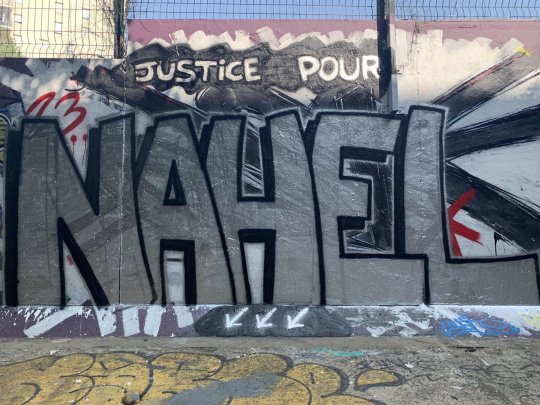
so last week, a 17y old boy was killed in Nanterre (what we call the "banlieue", so in periphery of Paris) by a cop. they made him stop on the side of the road and threatened him violently asking him to open the door. on the video, we can see the cop duo at the driver side window. one of them has his gun drawn to the boy's head. the other one says "shoote le" (shoot him) and the cop with his gun drawn says "jvais te mettre une balle dans la tête" (im gonna put a bullet in your head). the boy whose name is Nahel is logically scared so he speeds away. the cop shoots him in the car, bullet in the thorax and the car hits a wall. Nahel is dead and the video is quickly relayed on twitter to mass outrage.
most left leaning people condemn this and ask for justice, but the media keeps asking them to ask for calm and order (which some do, looking at Roussel) but some don't, which alienates them in the political landscape (the favorite word of the right rn is islamogauchiste aka islamiclefty).
but the right, god the right. first they said Nahel deserved it because he was driving without a license. then it was saying he was a criminal that had already been convicted (the cops leaked a fake criminal record). so not a criminal, but he was an Arab so he would've become one, right? and he should've just obeyed the cops and he would have been ok, that's the behavior of a criminal. I think you get the gist, fascist and fascist adjacent justifications for a cop murdering a boy.
since then, there have been riots in Nanterre and all around France, and the State, Macron (President) and Darmanin (Interior Minister) have sent cops galore. Now, the last time something like this happened was in 2005, when we had less social media and the only pictures and videos we had were from the media (opposed to the riots). Today with Snapchat and Twitter, we can see the pov of the rioters and people are realizing that amidst the anger people feel, they find joy in community, and the vibes in the riots are good and joyful at times (a guy asking another guy to go take a yop for him in the market they're breaking and stealing from comes to mind). They can't say just as easily that they're angry and irrational animal because they see the humanity in the riots (they shouldn't need it but well).
now there is a debate amongst both the rioters and the left who stays mostly outside of it. Are they being useful? breaking and burning the right things? should they go to Paris and take the risk of fighting against cops in streets that they don't know as well as their own? factually, they are mostly burning cars, trash and big companies' shops. But people are choosing to only see the rare schools and libraries being burned downed (who were, for a lot of them already falling down because the State doesn't give money to the periphery). Now, it seems logical to say that burning down your middle school is not going to help against police violence. But it feels like the same people who praise the revolution any chance they get refuse to understand that it comes at a price, with violence and at least a bit of destruction. And the right is using this to discredit the whole movement.
back to fascists. First, the cop "unions" Alliance and UNSA Police published a press release calling the rioters (so mostly Arab and Black people, but also poor white people living in the periphery) "nuisibles" (pest, the word used for animals harming the ecosystem). They wrote that the cops will resist, that they are at war, that they will bring order back. In short they want to kill POC. And they have help. Fascists groups have taken advantage of the situation to walk around blocks during the day and beating up people with bats and at night to illegally arrest rioters before tying them down with zip ties and giving them over to cops. and these people arrested who are sometimes barely older than 18 end up with 18 months of jail for burning trashcans and 10 months for stealing a can of Monster (and those are not suspended sentences).
and while these people end up in jail (thus making it more likely that they will end up with shitty jobs and shitty pensions), Jean Messiha (far-right guy) created a gofundme for the cop and his family that has already gathered more than 1.5 million euros. A cop kills a child and wins the million.
so is it violent? yes of course it couldn't be otherwise. but violence is sometimes necessary, especially when you have to fight back against cops, their fascist friends and the State that allows them to keep existing. The rioters deserve full support, even if the criticism of some of their actions should exist. The danger is for this criticism to overcome our support. It shouldn't. Because if they are alone like they were in 2005, the right and the far-right will take advantage of the situation. Last time Sarkozy was elected and the risk is greater this time, with Les Républicains (the republicans) being basically dead and leaving their spot to Marine Le Pen's fascist party Rassemblement National (national gathering).
so if you're french, don't let the people around you talk shit about the situation. and if you're not, be careful still, fascism is rising and they're not as scared as they were 20 years ago.
#upthebaguette#justice pour nahel#i know i forgot some stuff so if anyone want to add anything pls do
111 notes
·
View notes
Text
Why ‘chaos wheat’ may be the future of bread. (Washington Post)
Excerpt from this Washington Post story:
Farms were once a riot of biodiversity. A single field might have contained five different varieties of corn, a mix of oats and barley or whatever jumble of grains suited farmers from France to Ethiopia.
These offered a hedge against hardship: plant mixes in the field shifted with the weather. More rye one year, less wheat another. The French even had names for such flours with shifting ratios of grains, from “grande meteil” to “ble ramé,” each one rising into a delicious bread all its own.
But when industrial roller mills arrived in the late 1800s, the supply chain coalesced around white bread virtually overnight, writes Stephen Jones, founder of the Breadlab at Washington State University. The new mills meantwhite flour could be produced at enormous scale for low cost. Professional wheat breeders developed strains for refined white flour, stripped of its nutrient-rich germ, which could be stored longer. In 1890, 90 percent of U.S. households baked their bread at home. Forty years later, 90 percent were buying mass-produced white bread instead.
This transition to monoculture helped drive a fourfold increase in U.S. wheat yields. It also created a food system vulnerable to climate shocks and reliant on enormous inputs of agrochemicals. Today, global grain production emits more greenhouse gases than Russia, Brazil and Germany combined, while researchers in the journal Nature estimate that wheat yields in North America could fall 1 to 10 percent for every degree of warming without adaptation.
So I was intrigued when I saw King Arthur’s “climate blend” flour in the baking section of my supermarket. Could it be the vanguard of a new breed of crops making their way into everyday products?
I bought the flour for my kitchen. And I also obtained my own wheat seed climate blend from the Breadlab — a mix of Salish blue, a perennial released in 2021, as well as hardier varieties developed over the last few decades.
I wanted to see what it’s like to grow a wheat crop in my own backyard — and share it with readers around the world to hear about their experiences. Here’s what I learned trying to grow what the Breadlab calls “chaos wheat,” and why we still have a long row to hoe before the food system is on a sustainable path.
King Arthur Baking Company, the employee-owned company that released its Climate Blend Flour last year, is probably the most well known. The blend of wheat varieties, including a perennial capable of growing for years rather than being replanted every season, is part of King Arthur’s push to source 100 percent of its flour from “regeneratively grown wheat” by 2030. The result, says King Arthur, is a rich, nutty flour that can work in any whole-wheat recipe (something I confirmed in my own muffins).
The scale so far is tiny (just 120 acres), and prices are higher: A one-pound bag of Climate Blend Flour sells for $2.98, compared with $1.12 for standard whole wheat. But the company says it hopes to drive down costs as it assesses the climate benefits. “We believe in this work and understand it needs to be a long-term commitment,” Janis Abbingsole, the chief operating officer at King Arthur Baking Company, wrote in an email. “We need to allow time to listen to our growers and support them as they test and learn.”
19 notes
·
View notes
Text
Moderation in Social Networks
First Pavel Durov, the co-founder and CEO of Telegram, was arrested in France, in part due to a failure to comply with moderation requests by the French government. Now we have Brazil banning X/Twitter from the country entirely, also claiming a failure to moderate.
How much moderation should there be on social networks? What are the mechanisms for moderation? Who should be liable for what?
The dialog on answering these questions about moderation is broken because the most powerful actors are motivated primarily by their own interests.
Politicians and governments want to gain back control of the narrative. As Martin Gurri analyzed so well in Revolt of the Public, they resent their loss of the ability to shape public opinion. Like many elites they feel that they know what's right and treat the people as a stupid “basket of deplorables.”
Platform owners want to control the user experience to maximize profits. They want to be protected from liability and fail to acknowledge the extraordinary impact of features such as trending topics, recommended accounts, and timeline/feed selection on people's lives and on societies.
The dialog is also made hard by a lack of imagination that keeps us trapped in incremental changes. Too many people seem to believe that what we have today is more or less the best we will get. That has us bogged down in a trench war of incremental proposals. Big and bold proposals are quickly dismissed as unrealistic.
Finally the dialog is complicated by deep confusions around freedom of speech. These arise from ignoring, possibly willfully, the reasons for and implications of freedom of speech for individuals and societies.
In keeping with my preference for a first principles approach I am going to start with the philosophical underpinnings of freedom of speech and then propose and evaluate concrete regulatory ideas based on those.
We can approach freedom of speech as a fundamental human right. I am human, I have a voice, therefore I have a right to speak.
We can also approach freedom of speech as an instrument for progress. Incumbents in power, whether companies, governments, or religions, don’t like change. Censoring speech keeps new ideas down. The result of suppressed speech is stasis, which ultimately results in decline because there are always problems that need to be solved (such as being in a low energy trap).
But both approaches also imply some limits to free speech.
You cannot use your right to speech to take away the human rights of someone else, for example by calling for their murder.
Society must avoid chaos, such as runaway criminality, massive riots, or in the extreme civil war. Chaos also impedes progress because it destroys the physical, social, and intellectual means of progress (from eroding trust to damaging physical infrastructure).
With these underpinnings we are looking for policies on moderation in social networks that honor a fundamental right but recognize its limitations and help keep society on a path of progress between stasis and chaos. My own proposals for how to accomplish this are bold because I don’t believe that incremental changes will be sufficient. The following applies to open social networks such as X/Twitter. A semi-closed social network such as Telegram where most of the activity takes place in invite-only groups poses additional challenges (I plan to write about this in a follow-up post).
First, banning human network participants entirely should be hard for a network operator and even for government. This follows from the fundamental human rights perspective. It is the modern version of ostracism, but unlike banishing someone from a single city it potentially excludes them from a global discourse. Banning a human user should either require a court order or be the result of a “Community Notes” type system (obviously to make this possible we need some kind of “proof of humanity” system which we will need in any case for lots of other things, such as online government services, and a “proof of citizenship” could be a good start on this – if properly implemented this will support pseudonymous accounts).
Second, networks must provide extensive tools for facilitating moderation by participants. This includes providing full API access to allow third party clients, support for account identity and post authorship assertions through digital signatures to minimize impersonation, and implement at least one “Community Notes” like system for attaching information to content. All of this is to enable as much decentralized avoidance of chaos, starting with maintaining a high level of trust in the source and quality of content.
Third, clients must not display content if that content has been found to violate a law either through a “Community Notes” process or by a court. This should also allow for injunctive relief if that has been ordered by a court. Clients must, however, display a placeholder where that content would have been, with a link to the reason (ideally the decision) on the basis of which it was removed. This will show the extent to which court-ordered content removal is taking place.
What about liability? Social networks and third-party clients that meet the above criteria should not be liable for the content of posts. Neither government nor participants should be able to sue a compliant operator over content.
Social networks should, however, be liable for their owned and operated recommender algorithms, such as trending topics, recommended accounts, algorithmic feeds, etc. Until recently social networks were successfully claiming in court that their algorithms are covered by Section 230, which I believe was an overly broad reading of the law. It is interesting to see that a court just decided that TikTok is liable for suggestions surfaced by its algorithm to a young girl that resulted in her death. I have an idea around viewpoint diversity that should provide a safe harbor and will write about that in a separate post (related to my ideas around an "opposing view" reader and also some of the ways in which Community Notes works).
Getting the question of moderation on social networks right is of utmost importance to preserving progress while avoiding chaos. For those who have been following the development of new decentralized social networks, such as Farcaster and Nostr some of the ideas above will look familiar. The US should be a global leader here given our long history of extensive freedom of speech.
9 notes
·
View notes
Text


I keep referencing this scene from 1x8, so might as well make it easier for my self.
1692 Salem Witch Trials
1735 War for Independence (Our world: 1775-1783. The Molasses Act was passed in 1733, but was apparently routinely ignored before the end of the French and Indian War in 1763, and the resulting tensions ramped up until the riots began in 1772.)
1800 First Mexican War, 1810-1812 Second Mexican War (Our world: 1846-1848, after the Texas Revolution in 1836 and Mexico's own independence from Spain 1810-1821. In our world, the Louisiana Purchase was in 1803, leading to the Lewis And Clark and Pike Expeditions that decade. The UK supported Tecumseh's War in Indiana in 1811, rolling into the War of 1812, but which was the tail end of the Sixty Years' War era 1754-1813 of struggle between the UK, France, US, and Natives over the Great Lakes area.)
According to non-canon After The Storm, the Cession was created in the 1830s.
American Civil War 1840-1842 (Our world: 1861-65. As said above, in our world the 1840s was when the Mexican–American War took place.)
1908-1911 World War (Our world: WW1 1914-1918, Roaring 20s, Great Depression 1929-1939, WW2 1939-1945)
1940 The Hague (Our world: Notably, Geneva is not listed in this timeline, indicating that if Geneva was still a site of political importance, it wasn't to relevant witches. There were, however, also Hague Conventions of 1899 and 1907. The 1899 conference led to creation of the Permanent Court of Arbitration, and its housing, the Peace Palace, opened in 1913, also hosting many of the international organizations The Hague is known for today.)
1961-64 Chinese Civil War (Our world: 1927-49, with the US only making some minor moves about the Taiwan Strait.)
1960-present Proxy Wars (Our world: Cold War 1946-1991, NATO 1949, Korean War 1950-53, Vietnam War 1959-1975, Cuban Missile Crisis 1962, Moon landing 1969, Iranian Revolution 1979, Panama Invasion 1989, Gulf War 1990, Somalia and Bosnia/Herzegonia 1992, Haiti Invasion 1994, Kosovo 1996)
No mention of a Cold War or War on Terror (the latter not being surprising, given that it was replaced by the Spree)
Alder mentions the following locations as a part of "the early days" in 1x1:
Gibraltar (Great Siege 1779-83 stemming from Spain supporting the US in the Revolutionary War)
Tripoli (based on needing to have lifespan proximity to Gibraltar, this is about the Barbary Wars in the early 1800s between Ottoman Tripolitania and the US/Sweden)
Solomon Islands (rediscovered by Britain in 1767, Christian missionary work in the mid-1800s)
Alder's reminiscing from 2x9:
Bay of Bengal "running red with British blood", could be colonial or World War era.
Anatolian Plateau, probably about the Turkish War of Independence from the Ottoman Empire 1919-1923 after WWI, with Ankara becoming the new capital. Ankara is too far inland to be practical for the sea-based conflicts in the Barbary Wars and Aegean Sea conflicts. But there was also the Turkish "low-level civil war" 1976-1980.
Vienna, one summer, uhhhhhhhh probably World War events
Some other timeline notes:
1992 the Martyrdom in Liberia (Our world: immigration from the US with intent to colonize beginning in 1822, republic established 1847, coup in 1980, new republic in 1985, first Civil War 1989-1997, during which Greenville was destroyed.)
1994 Batan's bottles show up in Sudan (Our world: Sudan independence from Britain and UK in 1956, coup by al-Bashir in 1989, US sanctions in 1993)
1995 Batan's bottles show up in "in Minsk during the Belarus partition" (Belarus declared independence from the USSR in 1990, Lukashenko in 1994)
1997 First confirmed Spree attack
Some point in the 2000/10s: Bridey and her unit were in the Andes
Seven years ago (2012), per 1x6, Petra was in Belarus and encountered "The Balkan Composition".
The Balkan Composition was first deployed in "the Battle of the Urals", per 2x3
Willa and Quinn were stationed in Norilsk (a Russian city, west of the Urals) as a part of a siege at some point.
So what we see is that up to the World War, Alder's witch military mostly sped things up by a few decades (with the weird exception of the late 1700s/early 1800s, including Thomas Jefferson's presidency). Then, it seems that American hegemony would then delay/reduce much of the "modern" conflicts, or shift things around. Certainly, it seems that there was likely a large shift in the history of Eastern Europe and repercussions in East Asia.
#motherland fort salem#category: tv#I really really need to go back and add a mfs world building tag to the archives
8 notes
·
View notes
Text
Ecuador 'in state of war' against drug cartels' terror campaign
Schools and stores are shuttered, people are staying home as soldiers roam the streets of Ecuador's biggest cities.

Members of Ecuador's armed forces patrol a street during a security operation in the capital, Quito. [AFP]
With city streets largely deserted apart from a massive military deployment, Ecuador found itself in a "state of war" as drug cartels waged a brutal campaign of kidnappings and attacks in response to a government crackdown.
Hundreds of soldiers patrolled the capital, Quito, where residents were gripped by fear over a surge in violence that has also prompted alarm abroad.
The small South American country has been plunged into crisis after years of increasing control by transnational cartels that use its ports to ship cocaine to the United States and Europe.
The latest outburst of violence was sparked by the discovery on sunday of the prison escape of one of the country's most powerful narco bosses, Jose Adolfo Macias, known by the alias "Fito".
On Monday, President Daniel Noboa imposed a state of emergency and nighttime curfew, but the gangs hit back with declaration of "war" - threatening to execute civilians and security forces.
They also instigated numerous prison riots, set off explosions in public places and waged attacks in which at least 14 people have been killed.
More than 100 prison guards and administrative staff have been taken hostage, the prisons authority said.
In the port city of Guayaquil, attackers wearing balaclavas stormed a state-owned TV station on Tuesday, briefly taking several journalists and staff members hostage and firing shots in dramatic scenes broadcast live before police arrived.
Local media reported some of the attackers were as young as 16.
This attack, in particular, spread panic among the general population, many of whom left work and closed shops to return to the safety of their homes.
"Today we are not safe, anything can happen," said Luis Chiligano, a 53-year-old security guard in Quito who explained he was opting to hide rather than confront "the criminals, who are better armed".
Noboa said on Wednesday that the country was now in a "state of war," as he promised not to yield to the gangs.
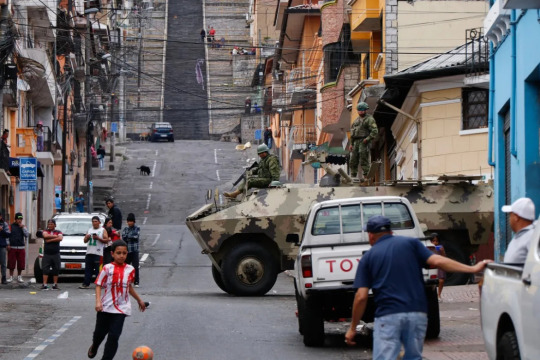
Ecuador's President Daniel Noboa gave orders on Tuesday to 'neutralise' the criminal gangs after gunmen stormed and opened fire in a TV studio, as bandits threatened random executions. [AFP]

Gangs declared war on the government after Noboa announced a state of emergency following the prison escape pm January 7 of one of Ecuador's most powerful narco bosses. [AFP]

United Nations Secretary-General Antonio Guterres was 'very much alarmed by the deteriorating situation in the country as well as its disruptive impact on the lives of Ecuadorans,' according to his spokesperson Stephane Dujarric. [AFP]
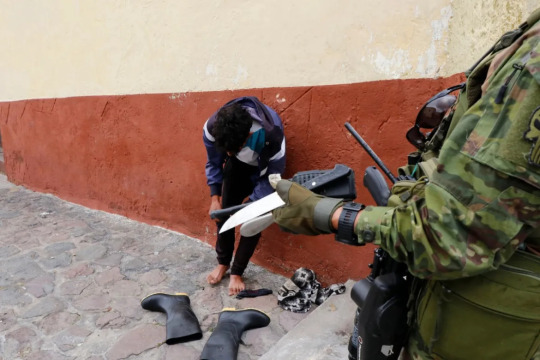
Peru declared a state of emergency on its border with Ecuador, sending an additional 500 police and soldiers to secure the frontier. [AFP]
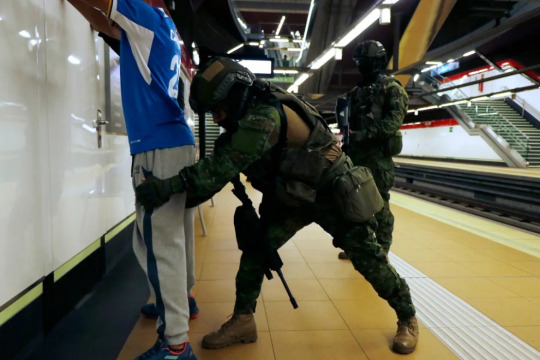
China's embassy and consulates in Ecuador suspended services to the public, while France and Russia advised citizens against travel to the country. [AFP]

Brian Nichols, the top US diplomat for Latin America, said Washington was 'extremely concerned,' pledging to provide assistance and 'remain in close contact' with Noboa's team [AFP]
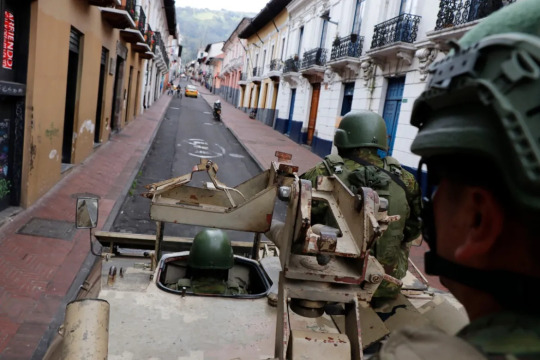
Colombia's army also announced it was bolstering border security. [AFP]
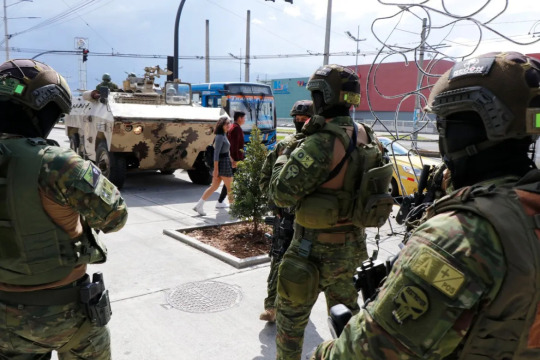
Ecuador's murder rate quadrupled from 2018 to 2022 and last year was the worst yet, with 7,800 murders in a population of about 17 million, and a record 220 tonnes of drugs seized. [AFP]
#terrorwave#terror wave#terror#news#ecuador#ecuador presidential candidate#gangs#narcos#Quito#“state of war”#Jose Adolfo Macias#Fito#United States#Europe#cocaine#President Daniel Noboa#Guayaquil#Luis Chiligano#Secretary-General Antonio Guterres#Stephane Dujarric#France#Russia#China#Brian Nichols#Colombia
17 notes
·
View notes
Text
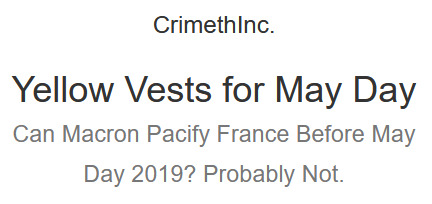
As May Day Approaches
Following this press conference, the government hoped that its official announcements would finally take the life out of the yellow vest movement, defusing the social tension that has built up. However, in the hours following Macron’s speech, several well-known yellow vest figures expressed their dissatisfaction with his proposals, calling for further demonstrations. In the end, even if some yellow vesters were sidetracked by Macron’s announcement, it was difficult to predict whether people would massively take the streets for the 24th act of the yellow vest movement.
On Saturday, April 27, about 23,600 yellow vesters demonstrated in France. For this new day of action, the epicenter of the movement was the city of Strasbourg. As the European elections will occur in a month, an “international call” was made to gather and march towards the European Parliament. Some Belgians, Germans, Italians, Swiss, and Luxembourgers participated as well. About 3000 demonstrators walked through the streets of Strasbourg, confronting police and engaging in property destruction. In the end, 42 people were arrested and at least 7 injured—three police officers, three demonstrators, and one passerby.
At the same time, two demonstrations took place in Paris. The first, organized by trade unions, drew about 5500 demonstrators, among them 2000 in yellow vests, while the other, mostly composed of several hundreds of yellow vesters, did a tour of all the major corporate media headquarters to ask for “impartial media coverage.” Other gatherings also took place in Lyons, Toulouse, Cambrai, and elsewhere in France. (All of the figures provided here are from the French authorities.)
If we compare the total number of participants in this 24th act to the other national days of action, it is undeniable that it attracted fewer participants. Does that mean that the government has finally gained the upper hand over the movement? It’s unclear. It is possible that some yellow vesters stayed home from the 24th act in order to prepare for May Day.
Last year, the intensity of property destruction and confrontations with police during the May Day mobilization of anarchists and other autonomous rebels compelled the government to cancel the entire traditional trade union march. In view of the tense social and political situation in France today, who knows what May Day 2019 could bring?
If the government attempts to cancel or repress demonstrations in Paris this May Day, the situation could become explosive. Not only because the police have adopted aggressive new law enforcement strategies over the past few weeks, but also because several calls have been made for yellow vesters to join autonomous rebels at the front of the traditional Parisian afternoon procession for the “ultimate act.” The objective is set: Paris is to become the capital city of rioting.
Here is an English adaptation of one of the calls, entitled Pour un 1er mai jaune et noir:
For a yellow and black May Day!
“When the government violates the rights of the people, insurrection is for the people and for each portion of the people the most sacred of rights and the most indispensable of duties.”
-Article 35 of the Declaration of the Rights of Man and Citizen (1793)
Macron’s government has decided to crush the current social protest by force, reaching a level of repression never seen before: prohibitions of demonstrations, deployment of soldiers, the use of armored vehicles, the use of chemical markers and weapons of war against protesters, jail sentences in spades, hands torn off, blinded protesters…
During the demonstration of May Day 2018, the Prefecture of Police counted 14,500 demonstrators “on the sidelines of the trade union procession” (almost as much as in the traditional procession) including 1200 “radical individuals.” On March 16, at the time of act 18, it was 1500 “ultra violent” ones who were present among the 7000 demonstrators, according to the figures of this same police.
Today, what frightens the state is not the rioters themselves, but the adhesion and understanding they arouse among the rest of the population. And this despite the calls, week after week, for everyone to dissociate themselves from the “breakers.”
If there is one group that currently strikes France with all its violence, it is not the “Black Bloc,” nor the yellow vests; it is rather the government itself.
We are calling on all revolutionaries in France and elsewhere, all those who want this to change, to come and form a determined and combative march. Because if repression falls on everyone, our response must be common and united. Against Macron and his world, let’s take the street together to revive the convergence of anger and hope. Let’s get ready, let’s equip ourselves, lets organize ourselves to overthrow him and drag him through a day in hell.
War has been declared!
[1] “Proportional representation” would mean that if, for example, 30% of voters vote for the Green Party, then members of that party would receive 30% of the total number of seats. So far, legislative elections offer no proportional representation—even if a party receives a large percentage of votes, it might not gain many seats at the assembly. People have been complaining about this “unfair process,” so now the government is willing to increase proportional representation in elections. Unfortunately, for several years now, the National Front has usually received around 20–25% of votes but only currently holds 6 seats out of the 577 in the Assemblée Nationale. Increasing proportional representation will give them more power in the decision-making—although, of course, it’s not clear to what extent Macron will actually follow through on his promises.
Of course, there is no option for people who have grown disillusioned with government itself: that perspective will never be “proportionately represented.” This is why the government refused outright to recognized blank votes.
#Macron#democracy#direct action#Ecology#fascism#France#May Day#Paris#reactionary activism#yellow vests#french politics#anarchism#resistance#autonomy#revolution#community building#practical anarchism#anarchist society#practical#anarchy#daily posts#communism#anti capitalist#anti capitalism#late stage capitalism#organization#grassroots#grass roots#anarchists#libraries
12 notes
·
View notes